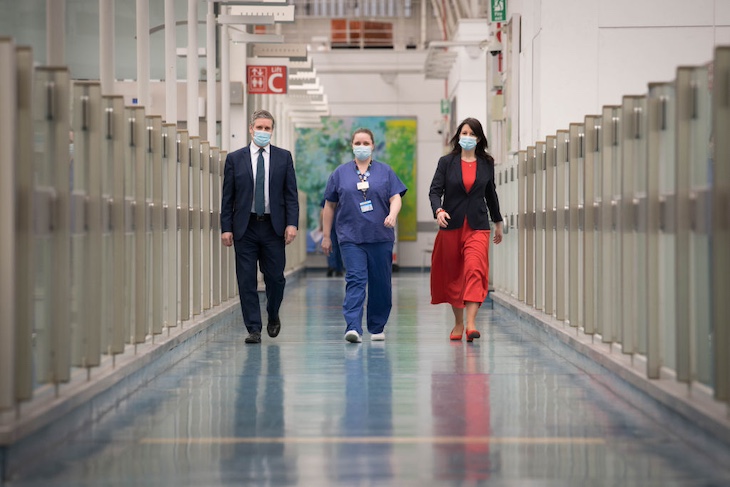The latest NHS waiting figures are without question a problem for Rishi Sunak: they’re going up again for the first time in seven months. The performance data for NHS England shows that 6.33 million patients were waiting for 7.6 million treatments at the end of April, up from 6.29 people and 7.54 million treatments in March. But given where the Tories are in this election campaign, the figures also represent a problem for Labour.
Voters already know that the NHS is struggling seriously, and they seem to be using that knowledge to turn to Labour in droves. Keir Starmer is launching his party’s manifesto today, and it will include pledges on the NHS and reforming the health service. But the amount of focus that Labour has – rightly – placed on the NHS means that voters will be expecting to see action early on.
Sunak has blamed the rise in the numbers waiting on industrial action, which always gets a groan from a studio audience because everyone knows the lists were rising even before Covid, let alone the doctors and nurses going on strike. But it is the case that the industrial action has had a huge impact on the health service’s ability to get through those waiting lists, and Labour has made clear repeatedly that it will resolve the dispute with the junior doctors. What it hasn’t been clear on is how.
Starmer himself has said that he would not accept the BMA’s demand of a 35 per cent pay hike, describing it as ‘unaffordable’. A Labour government may reset the tensions with doctors and give them a route out, particularly given the BMA is well aware from the past few years – and from the sweep of NHS history – of how risky it can be to overplay its hand in a long-running dispute. That seems to be the main strategy of Labour at the moment, as nothing else appears to be on the table.
Even with the industrial action resolved, the NHS is struggling to keep going and these figures, which relate to a traditionally quieter period for the health service, show quite how high the pressure is. A new government will take over responsibility for a health service that is running hot in the summer, which bodes very badly for its first winter. It will be very tempting at that point for Labour to fall into the cycle that governments have been stuck in for decades: of dealing with the urgent issues, but not getting around to the more important but less urgent need for reform.
The NHS great and good have been rubbing shoulders at their big annual event, run by the NHS Confederation, this week. Yesterday NHS England chief executive Amanda Pritchard told the conference that the service was ‘damaged’. ‘Yes, the post-Covid NHS is damaging,’ she said. ‘But it is not destroyed. It is struggling, but it is still doing incredible things every day.’ She added that the health service was at risk of being an ‘expensive safety net’ if politicians did not ‘grasp the nettle’ over funding and a shift to preventive healthcare.
The latter is something Wes Streeting – and his predecessor in the shadow health brief, Jon Ashworth – has talked about at length. That's why Pritchard was calling for it in her speech: she will have to work with Labour in a few weeks’ time, and needs to show that the NHS is willing to do the things a new government asks of it. A focus on prevention is already happening around the edges in the health service – the latest example being pensioners receiving health MOTs to try to reduce overcrowding in A&E. All very good and well, but the overall direction of travel in terms of the focus of funding and resources is still relentlessly towards acute care, rather than primary and community services.
Rebalancing the health service so it isn’t treating people at a much later stage than necessary (or, if preventive policies are working, so that it isn’t having to treat some people at all) is a laudable aim and essential for the NHS’s long-term survival. But it is also something politicians have paid lip service to for a long time, and without the current pressures on the health service. Labour’s hope will be that it can make the health service appear to be moving in the right direction after its first year in government, but changing the way the money and attention flows is going to be a much longer, and harder, task.








Comments